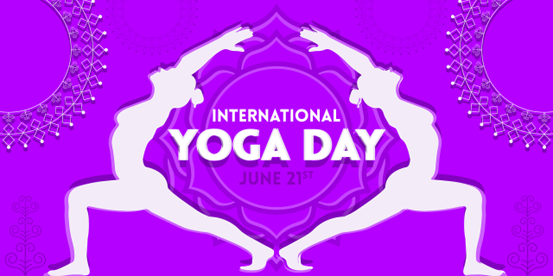Celebrating the 11th International Day of Yoga : 21st June
The 11th International Day of Yoga features the theme for 2025 is "Yoga for One Earth, One Health”. This read will provide you the details of some yoga benefits in our life and how world is celebrating it.
HEALTH
6/21/202511 min read


Introduction to International Day of Yoga
Yoga is an ancient practice that has gained immense popularity worldwide for its profound benefits on physical, mental, and emotional health. Yoga strengthens the body, calms the mind and fosters a heightened sense of awareness and responsibility in daily life. This mindfulness allows one to choose healthier and more sustainable lifestyles. Whether you are a beginner or an experienced practitioner, incorporating yoga into your daily routine can lead to holistic well-being.
The International Day of Yoga is celebrated globally on June 21st every year. This day was declared by the United Nations General Assembly in December 2014, recognizing the holistic benefits of yoga and its importance in promoting physical and mental well-being.
The idea for an International Day of Yoga was proposed by India's Prime Minister, Narendra Modi, during his address at the UN General Assembly in September 2014. The United Nations then adopted a resolution on December 11, 2014, with a record 175 member states endorsing it, officially proclaiming June 21st as the International Day of Yoga. The date was chosen because it is the Summer Solstice, the longest day of the year in the Northern Hemisphere, and holds special significance in many cultures. Since its inception, the International Day of Yoga has brought together individuals from diverse backgrounds to appreciate the myriad benefits yoga offers.
The significance of this day lies not only in the promotion of yoga as a holistic approach to health but also in fostering global peace and harmony. It emphasizes the unity of mind and body, man and nature, and promotes a lifestyle that encourages well-being and mindfulness. By designating a specific day for the practice and celebration of yoga, the United Nations aimed to raise awareness about the importance of incorporating yoga into daily life to combat the increasing levels of stress and sedentary lifestyles prevalent in modern society.
The International Day of Yoga aims to highlight the importance of physical health, mental clarity, and emotional stability that yoga can provide. It serves as a platform for educators, practitioners, and wellness advocates to share knowledge and experiences related to yoga and its benefits. As communities around the world come together to participate in various yoga sessions, workshops, and campaigns, this day serves as a reminder to embrace yoga’s principles, cultivate inner peace, and encourage a more balanced lifestyle.
Overall, the International Day of Yoga stands as a testament to the enduring legacy of yoga and its ability to revolutionize health and wellness on a global scale. The event continues to inspire millions as they engage in this timeless practice, reinforcing its profound significance in promoting a healthier and more harmonious world.
The History Behind Yoga
Yoga, a practice rich in history and tradition, originated in ancient India over five thousand years ago. It is deeply rooted in the spiritual and philosophical consciousness of the region, with its earliest references found in sacred texts known as the Vedas. These texts highlight not only the physical postures commonly associated with yoga but also the extensive spiritual and mental practices that encompass the discipline as a whole. Initially developed by sages, yoga served as a means to foster self-awareness and cultivate a deeper connection with the universe.
As centuries passed, the practice evolved significantly. The foundational principles of yoga were further enriched by texts such as the Yoga Sutras of Patanjali, written around the second century BCE. This seminal work defined yoga as an ethical and mental discipline and introduced the eight limbs of yoga, which include practices ranging from ethical behavior to meditation. Such philosophical underpinnings have allowed yoga to flourish as not only a physical practice but also an avenue for spiritual enlightenment and personal development.
Throughout history, various styles of yoga have emerged, each contributing to the rich tapestry of this ancient art. Hatha yoga, for instance, focuses primarily on physical postures and their integration with breath control, while other styles like Kundalini and Ashtanga emphasize energy flow and dynamic sequences. This evolution illustrates yoga’s adaptability, as it has been embraced worldwide, blending with multiple cultural influences. Today, yoga is recognized not merely as a form of exercise but as a comprehensive, holistic approach to well-being, addressing the mind, body, and spirit. By tracing its rich history, one begins to appreciate yoga's significance in promoting overall health and inner peace.
The Essence of Yoga
Yoga, an ancient practice originating from India, combines physical postures, breathing exercises, and meditation to foster balance and harmony in the body and mind. The significance of yoga transcends mere physical exercise; it is a pathway to mindfulness and self-awareness. The resolution notes “the importance of individuals and populations making healthier choices and following lifestyle patterns that foster good health.” In this regard, the World Health Organization has also urged its member states to help their citizens reduce physical inactivity, which is among the top ten leading causes of death worldwide, and a key risk factor for non-communicable diseases, such as cardiovascular diseases, cancer and diabetes.
The Theme of the 11th International Day of Yoga
The 11th International Day of Yoga features the theme for 2025 is "Yoga for One Earth, One Health”
IDY has become a global movement, uniting millions of people in the practice of yoga and highlighting its role in promoting holistic health, harmony, and peace. Each year, a specific theme is chosen to focus on a particular aspect of yoga's benefits. A reflection of the emerging global focus on holistic health and well-being. This theme emphasizes not only the physical benefits of yoga but also its profound impact on mental and emotional health. In a world increasingly characterized by rapid change and uncertainty, the need for practices that foster social harmony and personal well-being has never been more important.
This year's theme underscores the integral role yoga can play in addressing pressing societal issues, such as mental health challenges exacerbated by the pandemic, increasing levels of stress, and the quest for peace in a tumultuous world.
In light of these considerations, the 11th International Day of Yoga invites individuals to embrace the transformative potential of yoga. It is not just about personal benefits; it is a collective journey toward a healthier, more peaceful, and united humanity.
Global Celebrations and Events
The 11th International Day of Yoga, observed on June 21st, serves as a global platform to highlight the myriad ways in which communities and countries participate in yoga celebrations. As yoga has transcended cultural boundaries, each nation brings its unique flavor to the observance of this day, fostering a sense of unity among practitioners around the world. From grand outdoor events to intimate gatherings, the activities are as diverse as the participants themselves.
Many countries organize large-scale events, often in prominent public spaces. For instance, in India, flagship events are hosted at iconic locations such as the banks of the Ganges or major historical landmarks, where thousands of participants come together to practice yoga simultaneously. Such activities not only highlight the physical postures of yoga but also emphasize the importance of mental and spiritual wellness. In cities like New York and London, yoga enthusiasts often gather in parks to participate in mass yoga sessions, celebrating the day with a shared commitment to health and wellness.
In addition to outdoor classes, workshops and seminars are frequently organized, focusing on the philosophical aspects of yoga, including meditation and breathing techniques. These sessions aim to deepen participants' understanding of yoga beyond physical exercise. Schools, workplaces, and community centers also play a crucial role, incorporating yoga classes into their routines to promote wellness among students and employees alike. Social media campaigns further amplify these celebrations, allowing individuals to share their experiences and engage with a broader audience.
Ultimately, the celebrations of the International Day of Yoga demonstrate the collective commitment to health and well-being, encouraging individuals to adopt yoga as a holistic practice. By bringing people together across various cultures and backgrounds, this day not only underscores the universality of yoga but also enhances the communal spirit that defines it.
Benefits of Practicing Yoga
Yoga, a holistic discipline rooted in ancient philosophy, offers an array of physical, mental, and emotional benefits that have made it increasingly popular in modern society. One of the most notable advantages of regular yoga practice is the improvement in flexibility. Research indicates that incorporating various postures and stretches can significantly enhance range of motion, reducing the risk of injuries and promoting overall physical health. As individuals engage in different yoga styles, they often experience increased muscle strength, which not only supports physical fitness but also fosters better posture and balance.


In addition to the physical benefits, yoga has been widely recognized for its positive impact on mental well-being. Many studies have demonstrated that yoga can effectively reduce stress and anxiety levels. By utilizing breath awareness and mindfulness techniques, practitioners can activate the body's relaxation response, leading to lower cortisol levels and a greater sense of calm. This meditative aspect of yoga aids in fostering mental clarity, enhancing focus, and promoting emotional resilience, which can be particularly beneficial in our fast-paced, modern lives.
The integration of yoga into daily life does not need to be daunting. Even short, daily sessions can yield significant benefits, making it accessible for individuals at any fitness level. For those with busy schedules, a brief morning routine or a calming evening practice can make a meaningful difference. Furthermore, the principles of yoga—such as mindfulness and intentional movement—can also be applied outside of the mat, encouraging healthier choices and a more balanced lifestyle overall. Given the extensive range of benefits that yoga provides, it serves as a valuable practice for enhancing both physical and mental wellness.
Some key benefits of practicing yoga regularly include:
1. Physical Benefits:
Increased Flexibility: Yoga postures (asanas) are designed to stretch and lengthen muscles, tendons, and ligaments, improving range of motion in joints and overall body flexibility. This can significantly reduce stiffness and improve mobility in daily activities.
Enhanced Respiration and Lung Capacity: Deep breathing techniques (pranayama) are central to yoga. These exercises expand lung capacity, increase oxygen intake, and improve overall respiratory health. This can be particularly beneficial for individuals with conditions like asthma.
Improved Balance and Stability: Poses like Tree Pose and Eagle Pose challenge your balance, enhancing coordination and reducing the risk of falls, especially as you age.
Better Posture: By strengthening core muscles and improving flexibility, yoga helps to correct poor posture, which can alleviate discomfort and pain in the neck, shoulders, and back.
Pain Relief: Yoga can be effective in alleviating chronic pain, including lower back pain, arthritis symptoms, headaches, and carpal tunnel syndrome. It does this by increasing flexibility, strengthening supporting muscles, and promoting relaxation.
Bone and Joint Health: Weight-bearing yoga postures can strengthen bones and help prevent osteoporosis. It also promotes the release of fluids that lubricate joints, improving their function.
Weight Management: Dynamic yoga styles can burn calories, while restorative styles aid digestion and reduce bloating. More importantly, yoga can foster mindful eating habits, helping individuals become more aware of hunger and satiety cues.
2. Mental and Emotional Benefits:
Stress Reduction: Yoga is renowned for its calming effects. It helps to lower levels of cortisol (the "stress hormone") and activate the parasympathetic nervous system, leading to a state of relaxation.
Reduced Anxiety and Depression: Studies show that consistent yoga practice can reduce symptoms of anxiety and depression, likely due to its ability to lower stress hormones and increase beneficial brain chemicals like endorphins and GABA (gamma-aminobutyric acid).
Improved Mental Clarity and Focus: The concentration required to hold poses and focus on breath helps to quiet the mind, leading to greater mental clarity, improved attention span, and sharper concentration.
Better Sleep Quality: By calming the nervous system and reducing overthinking, yoga can help individuals fall asleep faster, sleep for longer durations, and wake up feeling more rested.
Mood Enhancement: Regular yoga practice can boost mood and increase feelings of happiness and well-being.
3. Spiritual Benefits:
Cultivating Awareness and Mindfulness: Yoga encourages you to be present in the moment, fostering a deeper awareness of your thoughts, emotions, and actions.
Greater Inner Peace and Serenity: Through practices like meditation and breath control, yoga helps to quiet the fluctuations of the mind, leading to a sense of stillness and tranquility.
Enhanced Self-Awareness and Self-Acceptance: By turning inward, yoga promotes self-reflection, helping you to understand and accept yourself more fully.
Sense of Purpose and Meaning: For many, yoga can help align actions with deeper values and beliefs, leading to a greater sense of purpose in life.
Personal Stories and Testimonials
Yoga has become a transformative practice for many individuals around the globe, manifesting as a vital component in their journeys toward holistic health and well-being. One poignant story comes from Sarah, a 35-year-old woman who struggled with anxiety and stress due to her demanding job in finance. After participating in a beginner's yoga class, Sarah found a profound connection to her breath and body. "Yoga taught me how to remain grounded, even during the most chaotic days," she recounts, emphasizing how the incorporation of mindful breathing and meditation techniques helped her manage her anxiety. Over time, Sarah’s dedication to her practice not only alleviated her stress but also empowered her with a sense of clarity and resolve.
Another transformative experience comes from John, a retired veteran in his mid-60s who faced considerable physical limitations and chronic pain. Seeking a way to improve his quality of life, John turned to adaptive yoga classes provided by his local community center. "At first, I was intimidated by the idea of practicing yoga, but the instructor's understanding and mindfulness helped me feel at ease," he shared. Through gentle stretching and modified poses, John's flexibility improved and with it, his pain diminished. The camaraderie fostered within the class also became a crucial aspect of his recovery, illustrating how yoga not only enhances physical health but also fosters emotional connections.
These testimonies are a mere glimpse into the countless narratives being shaped daily through yoga. Individuals from all walks of life share similar sentiments, ranging from finding emotional balance to overcoming substantial health challenges. The stories of Sarah and John highlight the diverse impact of yoga, and they echo a universal truth: regardless of one’s starting point, yoga invites each practitioner to embark on a journey of self-discovery and healing. With dedication and an open heart, transformation through yoga is indeed possible for everyone.
How to Get Involved and Celebrate
Celebrating the 11th International Day of Yoga on June 21st offers a wonderful opportunity for individuals and communities to engage with this ancient practice. There are multiple ways to participate, whether through local events, personal practice, or community involvement. Attending local yoga classes and workshops is a great way to connect with others who share an interest in yoga. Many studios will offer special events, classes, or workshops that are specifically designed to celebrate this day. It’s advisable to check local listings or websites of yoga studios to find out what unique offerings they may have.
Another enriching way to celebrate is by organizing community events or gatherings. This might include a public group yoga session in a park or a potluck where individuals can share healthy recipes and discuss the benefits of yoga. Engaging with your community not only spreads awareness about the importance of yoga but also fosters a sense of belonging and support among participants. Consider reaching out to local schools or community centers to see if there is an interest in hosting a yoga-themed workshop or seminar that caters to various age groups.
If you prefer a more personal celebration, practicing yoga at home can also be a fulfilling way to honor this day. Many online platforms provide live-streamed classes or tutorials that cater to different skill levels and preferences. By following along at home, individuals can create a comfortable space to delve deeper into their practice. Additionally, it is beneficial to explore the philosophy behind yoga by reading foundational texts or articles that explore its principles and ethics, which can deepen understanding and appreciation for the practice.
To further explore yoga practices and philosophy, resources such as books, online courses, and apps can be invaluable. Websites dedicated to yoga often provide guidance on various styles, techniques, and meditative practices. Engaging in yoga on this international day is more than just a physical practice; it is a holistic approach to enhancing mental and spiritual well-being.
Stay Healthy, Stay Safe.
Thanks for reading, please share to help others.


Inspire, Share, Explore
Explore life’s journey through creativity and growth. Inspire, Share, Explore
Disclaimer: This website is to spread information, awareness, knowledge and good things to the people. The information provided on this website is intended for general informational purposes only and should not be considered as professional advice. While we strive to maintain accurate and up-to-date content, we make no guarantees regarding the completeness, reliability, or suitability of the information presented. Users should verify any information before relying on it, and we encourage consulting with qualified professionals for specific inquiries or concerns. By using this website, you acknowledge that any reliance on the information is at your own risk. We disclaim any liability for any losses or damages arising from the use of this website or any linked content. Thank you for understanding, and we hope you find the information helpful.
Community
Connect with us
dciauxil@gmail.com
© 2025 by IAUXIL The Real Stimuli. All rights reserved.
